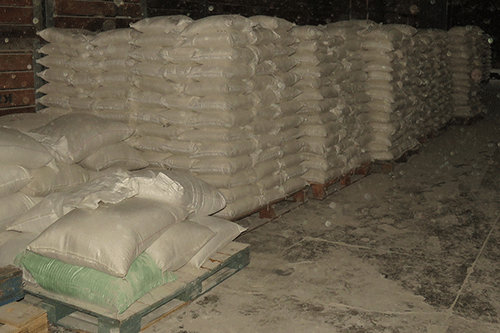Absalom Shigwedha
A privately-operated green scheme in Kavango West region is producing maize meal for the education ministry’s school-feeding programme (SFP).
Winfred Metzger, who is running the Musese Green Scheme, said the maize meal is being milled and blended at the green scheme’s milling station at the Musese village.
He said the main aim of having green schemes in the country is to achieve food security and improve the livelihoods of the community through food production in areas in which they operate as well as to create jobs.
The school-feeding programme is aimed at helping pupils from poor families with food.
At its milling station, the green scheme is producing 12.5 kg bags of maize meal which the ministry distributes to various schools in the country.
Inaugurated in 1977, the Musese green scheme currently has 105 employees and hires about 200 temporary employees to assist with other activities.
Metzger said primarily, green schemes should strive to achieve food security. The second goal is to educate future generations so that the country can have future farmers, really be profitable and plough back into the community.
The objectives of the SFP are to increase enrolment at schools, to increase regular attendance and to improve retention and progression through grades while also improving their general health and concentration levels.
Through his private green scheme at Kanyikama, Metzger has also been uplifting communities for the past years.
To do this, he has drilled 22 boreholes between Nkurenkuru and Katwitwi thus far for both communities and schools, and he plans to drill two more for the Nzinze and Siku communities.
He further noted that drilling boreholes for communities is part of giving back to the people, saying everyone is supposed to have access to potable water. Metzger said this also reduces the human-wildlife conflict, particularly when people have to fetch water from rivers where there is a high risk of crocodile attacks.
Metzger stressed that he gives back in this form, as his business is nothing without the support of the people.
Elaborating on the challenges at the green scheme, Metzger pointed out constant power outages and lack of internet connection as two of the main problems.
He noted this negatively affects production, as the running of the automatic system that irrigates and applies fertilizer is not possible without internet access.
Metzger added that due to power interruptions, the young maize that was planted around mid-December last year experienced heat waves – and due to power interruptions, they were unable to irrigate, thus, crops did not get water on time.
“Time to repair or restore power takes too long, and a lot of our small plants suffered. Roots got burnt, plants got burnt and they are difficult to recover again,” he explained.
Metzger also called for a need to educate the community on the sabotaging effects of vandalism. This is in response to infrastructure being deliberately damaged through the cutting of poles and wires. He added the culprits should be dealt with to the full extent of the law if found.
*Absalom Shigwedha is a freelance journalist.



